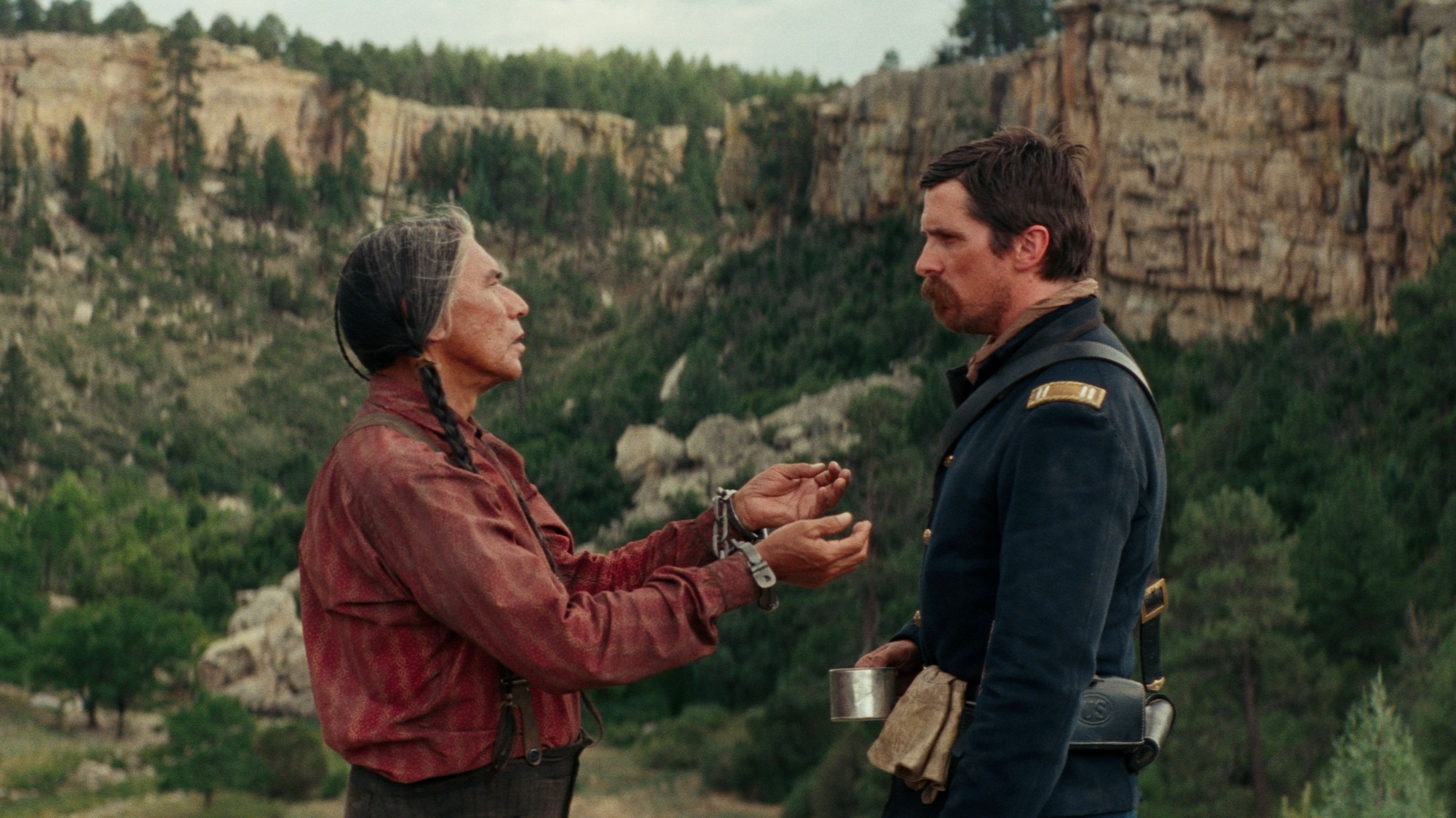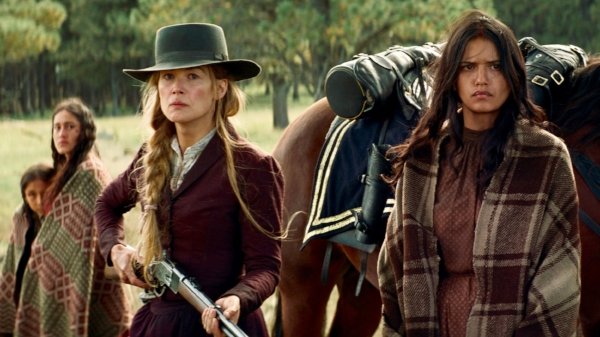Learning to Respect Your Enemies—the Western “Hostiles”

Hostiles; Image courtesy of Waypoint Entertainment from Moviestillsdb.com
Disclosure: This post may contain affiliate links, meaning Beautiful Christian Life LLC may get a commission if you decide to make a purchase through its links, at no cost to you.
Despite its aggressive title, Hostiles is really about forgiveness, reconciliation, and learning to respect others—even those you might regard as enemies.
Released in January and now available on DVD and streaming, the well-reviewed Western from writer-director Scott Cooper (Crazy Heart, Out of the Furnace) is a mesmerizing blend of opposites: grim and hopeful; modern and traditional; reflectively slow, yet gripping and suspenseful. Plus, it takes Christian faith seriously, paying respect to both the Bible and believers, while also acknowledging the brutal challenges of the Wild West in 1892.
Pilgrims…
The story seems simple enough. U.S. Cavalry officer Joseph Blocker, famed for violent but victorious battles in the Indian Wars, reluctantly accepts a commission from President Harrison: he and a few hand-picked soldiers will escort a dying Cheyenne named Yellow Hawk, along with his family, to their beloved homeland in Montana, so the chief can die in peace.
Blocker hates the assignment and accords no courtesy to his charges. And then to make matters worse, the group is joined by Rosalee Quaid, a grieving widow whose entire family has just been killed by Comanches. Later, Blocker also agrees to take soldier Phil Wills back to his unit for court martial—after Wills butchered several Native Americans and then deserted.
One of the finest Westerns since Clint Eastwood’s Unforgiven (1992), Hostiles is distinguished by its top-flight cast: Christian Bale, who learned to speak Cheyenne in preparation for his excellent work as Blocker—a role Cooper wrote specifically for him; Rosamund Pike, giving her finest performance yet as Rosalee; Native American Wes Studi as Yellow Hawk; and a bevy of veteran character actors in supporting roles, including Ben Foster, Bill Camp, Stephen Lang, Rory Cochrane, and Jesse Plemons. Newcomer Jonathan Majors makes a memorable impression as Henry Woodson, a Buffalo soldier who’s worked with Blocker for years.
…Through This Barren Land
Also notable is the film’s careful authenticity. Its palpable texture is no doubt aided by the fact that Cooper shot on film rather than digital, which is now the industry standard. He also kept several Cheyenne consultants on set—including a hereditary chief—who worked on costumes, customs, and diction (apparently, Blocker’s language is genuine but slightly flawed). The film’s Fort Berringer was built from the ground up using 70,000 adobe bricks, and the movie was shot on location in New Mexico, Colorado, and Arizona—including a final scene at the famed Cumbres and Toltec tourist railroad in Chama, New Mexico.
Indeed, the barren landscape, relieved by distant mountains and pastel sunsets, goes a long way toward establishing this movie’s tone. In the words of producer John Lesher, the terrain has a “rough beauty—a kind of bristly Brillo Pad beauty, a harshness … that really is like a character in the film itself.” It’s fitting, then, that what most marks Cooper’s masterpiece is its ability to craft beauty out of horror; friendship out of hate; faith out of doubt; and strength out of weakness.
The Good and the Bad
Brutality is instantly established in the opening massacre on the Quaid farmstead. Thanks to careful sound design involving a woman moaning, scene two swiftly sets up a parallel between this Comanche brutality and Blocker’s own cruel treatment of Native Americans—a parallel the film keeps stressing, especially when both Blocker and Yellow Hawk are described as having slashed victims “from stem to stern.”
This deservedly R-rated film has plenty of suffering, bloodshed, and death (not to mention some profanity). Yet Cooper does not dwell on the gore; a series of horrific rapes is never shown at all, while another scene of butchery is heard but not seen behind a set of tent walls.
In a brief pause among these terrors, Rosalee asks Blocker, “Do you believe in the Lord, Joseph?”
“Yes, I do, Mrs. Quaid,” comes the firm reply. “But he’s been blind to what’s goin’ on out here for a long time.”
The film’s repeated references to Christmas feel odd in this bleak and arid locale, suggesting that God does indeed seem remote and far away. Yet the story line is peppered with acts of grace that evoke his goodness again and again—and a handful of Scripture references bring this out all the more clearly.
The Kind and the Cruel
The narrative’s many kindnesses include a touching friendship that unexpectedly blossoms between Rosalee and the Cheyenne. Recognizing her grief and loss, they give her a new dress, which she then wears in subsequent scenes. (This gesture is nicely echoed when the commander of Fort Winslow buys another new dress for Rosalee, showing that parallels between the races can be positive, too.) Similarly, one of the Cheyenne women braids Rosalee’s hair—an Indian custom which Blocker had earlier forbidden his captives.
All this sets the stage for a gradual respect that develops between Blocker and Yellow Hawk, underlining how enemies can become friends if they will just spend some time together and treat one another as individuals—rather than stereotyped members of a hated race.

So this is a revisionist Western, reworking the age-old trope of Indians as enemies and cowboys as white-hatted heroes. Yet in many ways it remains a very old-fashioned oater—rife with gunfire, damsels in distress, desert vistas, savage killers, and dusty barren towns. Nowhere is tradition more clearly affirmed than in the gallant, chivalrous way these tough soldiers defer to Pike’s desperate widow, allowing her to grieve in whatever way she needs—and for however long.
Blocker leads the way in this, and that’s largely why his surprising transformation works—because the hardened captain has already demonstrated much selfless love throughout the story. Toward the middle of the film, he is warmly thanked by the soldier Woodson, whom the captain apparently took under his wing when no one else would. Along the same lines, Blocker begins his overland trek by reinstating his old friend Metz (Cochrane), who’d been struggling with depression and had his guns taken away.
Yet, as the Metz plot-strand indicates, Blocker is no hero. He’s done many awful things—clarified in his discussions with both Metz and Wills. In particular, his final violent action here is plainly unjustified—included, it would seem, to show that he now understands how the Indians feel, especially since this concluding squabble centers on the issue of who owns the land and has a right to use it.
The Weak and the Strong
This film is never simple. Just as there are good Indians and bad, there is good and bad in Blocker, who reads Julius Caesar’s imperialistic Gallic Warsbut also carries—and knows—the Bible.
Indeed, Blocker is one of several characters who affirm traditional Christian beliefs. He makes a fitting quote from Proverbs (“Be not thou envious against evil men; neither desire to be with them; for their heart studieth destruction”); and Woodson movingly voices a selection from Psalm 27 after Rosalee’s family has been interred:
He will conceal me in the shelter of his tent and set me high upon a rock. Even now my head is held high above my enemies on every side, and I will offer in his tent sacrifices with shouts of happiness. I will sing and chant praises to the Lord.[1]
Considering the awful things that happen in Hostiles, this quote might sound ironic; but Cooper and Majors take the verses at face value, just like the lines of a hymn Woodson sings a short time later:
Guide me, O Thou great Jehovah, pilgrim through this barren land. I am weak but Thou art mighty; hold me with Thy powerful hand.
The Powerful Hand of Providence
Like many other opposites in this film, the weak/strong idea is a recurring motif—as when one Cheyenne says of Rosalee, “Experiencing such loss as she has requires great strength.” Just as our weakness makes room for God’s strength, so the film’s darkness, grief, and loss are the very things that allow faith and goodness to shine most brightly.
“Death rides on every hand,” Blocker tells Woodson after a particularly close call. “In this case, a kind Providence was watching over you.”
“I have to believe it’s times like these that strengthen our bond with him,” says Rosalee during a fireside moment with Blocker. “If I did not have faith, what would I have?”
Later, she again tells the captain, “We’ll never get used to the Lord’s rough ways, Joseph.”
The film surely shows this. Yet at the same time, it also offers enough light and hope to suggest that we are indeed in the “powerful hand” of a “kind Providence.”
Notes:
[1] Blocker quotes Proverbs 24:1-2, Woodson paraphrases Psalm 27:5-7. Devotees of Scripture will note that unlike Blocker, Woodson does not quote verbatim from the King James Bible—virtually the only translation available in that era; but then Woodson, as a black soldier in the 19th century, is very possibly unable to read—and in any case, he seems to be quoting this passage from memory.

